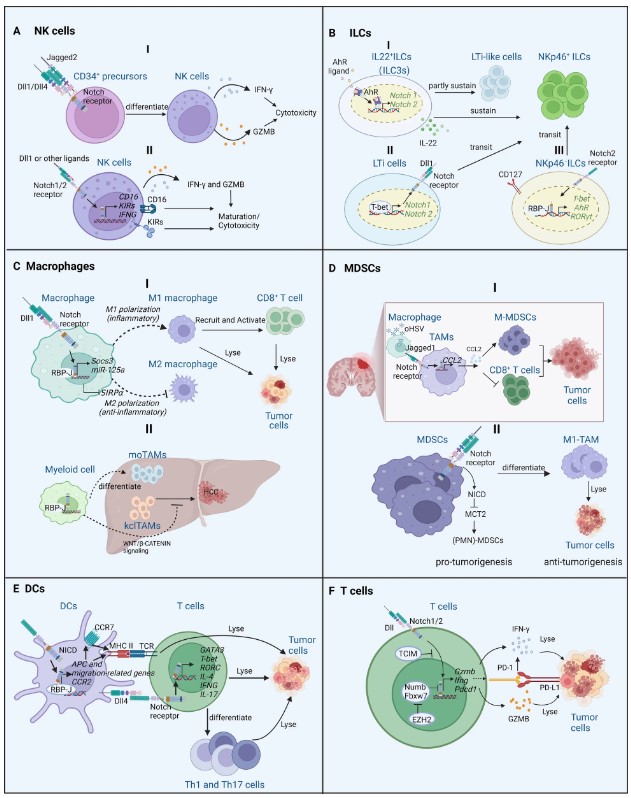All products and services are For Research Use Only and CANNOT be used in the treatment or diagnosis of disease.
In the rapidly advancing field of cell therapy, the use of Notch ligand-induced cell development holds promise for revolutionary treatments. Creative Biolabs has been at the forefront of this advancement for over two decades, leveraging the intricate Notch signaling pathways to develop highly functional immune cells. Our technology enables the scalable production of lineage-specific cell products, offering unparalleled flexibility and safety for therapeutic applications.
Creative Biolabs' Notch Ligand Platform capitalizes on the ability of Notch ligands such as Jagged2, Delta1, and Delta4 to induce differentiation and expansion of various immune cell lineages from CD34+ hematopoietic progenitor cells (HPCs). These HPCs are derived from cord blood, providing a reliable and ethics-compliant source with high regenerative capacity and minimal risk of tumorigenicity or transmissible diseases.
Studies have confirmed that Notch signaling is crucial for the differentiation of natural killer (NK) cells, macrophages, and other crucial immune cells. For example, Notch ligands Jagged2, Delta1, and Delta4 have been shown to expedite the development of NK cells from CD34+ HPCs, generating cells with substantial cytotoxic capabilities against tumor cells. This robust approach significantly reduces the variability and unpredictability commonly associated with donor-derived cells, ensuring a high yield of functional immune cells.
 Fig.1 Regulation of Notch signaling in different immune cells.1
Fig.1 Regulation of Notch signaling in different immune cells.1
Activation of Notch signaling has been found to enhance the anti-tumor properties of NK cells and macrophages. Enforced expression of Jagged2 in dendritic cells (DCs) and other stromal cell types significantly increases the cytolytic effects of NK cells against various cancer cell lines. This suggests that the targeted activation of Notch signaling in immune cells can be a promising strategy for boosting cancer immunotherapy.
Creative Biolabs provides an industry-leading Notch Ligand Allogeneic Cell Development Service designed to fulfill the needs of groundbreaking research and clinical applications. Our service leverages advanced cell culture techniques and rigorous quality control processes to yield highly effective allogeneic cell therapy products.
Service Details
Source: Donor-qualified cord blood units from FDA-licensed public cord blood banks.
Advantages: No need for donor genotyping or matching, overcoming donor-to-donor variability.
Expansion: Notch-mediated CD34+ cell expansion and directed differentiation.
Engineering Flexibility: Extensive options for cell engineering from stem cell expansion to differentiation.
The use of CD34+ cells from cord blood minimizes genetic mutations and tumors.
Offers ultimate flexibility in methods and timing for cell engineering.
Allogeneic, off-the-shelf products eliminate the need for HLA matching.
Q1: How does the use of Notch ligands enhance cell therapy?
A1: Notch ligands accelerate the differentiation and expansion of functional immune cells from CD34+ HPCs. This not only boosts the production of therapeutic cells but also enhances their efficacy in targeting and eliminating tumor cells.
Q2: What are the main safety concerns addressed by Creative Biolabs' platform?
A2: By using cord blood-derived CD34+ cells, our platform minimizes risks associated with genetic mutations, tumor formation, and transmissible diseases. Our extensive safety record across numerous clinical applications reinforces the reliability of our service.
Q3: What makes NK cells generated through Notch ligand signaling unique?
A3: NK cells from our platform are devoid of inhibitory receptors like KIR and NKG2A, making them universally alloreactive and highly effective in identifying and lysing tumor cells irrespective of the patient's MHC class I antigen profile.
Creative Biolabs' Notch Ligand Allogeneic Cell Development Service leverages cutting-edge technology to deliver highly effective and versatile solutions, breaking new ground in cell-based therapies for cancer and other diseases. Our robust platform ensures safety, efficacy, and immediate availability, setting a new standard in the realm of allogeneic cell therapy.
Reference
For any technical issues or product/service related questions, please leave your information below. Our team will contact you soon.
 NEWSLETTER
NEWSLETTER
The latest newsletter to introduce the latest breaking information, our site updates, field and other scientific news, important events, and insights from industry leaders
LEARN MORE NEWSLETTER NEW SOLUTION
NEW SOLUTION
CellRapeutics™ In Vivo Cell Engineering: One-stop in vivo T/B/NK cell and macrophage engineering services covering vectors construction to function verification.
LEARN MORE SOLUTION NOVEL TECHNOLOGY
NOVEL TECHNOLOGY
Silence™ CAR-T Cell: A novel platform to enhance CAR-T cell immunotherapy by combining RNAi technology to suppress genes that may impede CAR functionality.
LEARN MORE NOVEL TECHNOLOGY NEW SOLUTION
NEW SOLUTION
Canine CAR-T Therapy Development: From early target discovery, CAR design and construction, cell culture, and transfection, to in vitro and in vivo function validation.
LEARN MORE SOLUTION